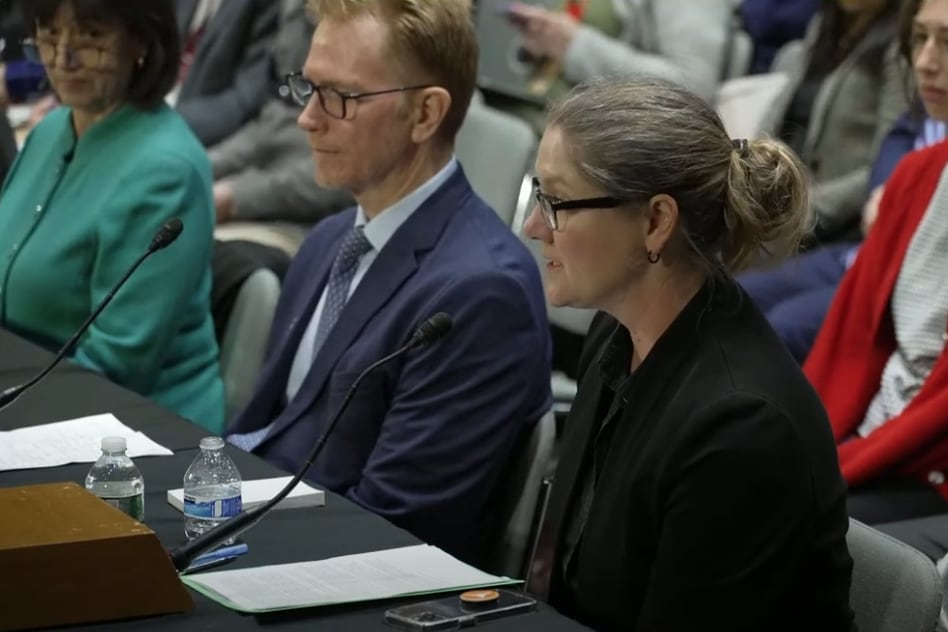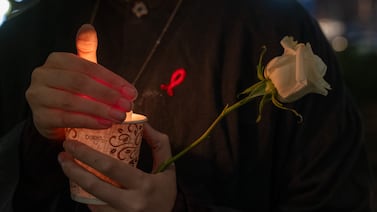Public health, explained: Sign up to receive Healthbeat’s free Atlanta newsletter here.
Alzheimer’s prevention research and training for future scientists are among the Georgia programs canceled by federal funding cuts implemented abruptly by the new Trump administration.
The sudden termination of a grant from the National Institutes of Health forced Emory University professor Whitney Wharton to take down websites and cancel appointments for people at risk for Alzheimer’s disease contributing to her study. At the University of Georgia, professors are searching for funds to help their students finish out the academic year after NIH support for their training was canceled.
The nation’s main health research agency, the NIH, has canceled hundreds of grants totaling more than $1 billion because they study racial minorities and LGBTQ people and help promote diversity in science. The cancellations follow executive orders from President Donald Trump calling on federal agencies to end diversity, equity, and inclusion programs, to recognize just two sexes, and remove references to transgender people and “gender ideology.”
That includes more than a dozen awards to Georgia universities, according to a list of canceled grants from the U.S. Department of Health and Human Services, the NIH parent agency. The cuts come amid a hiring freeze at Emory; layoffs of about 2,400 employees at the Centers for Disease Control and Prevention, many in Atlanta; cuts to Georgia public and mental health agencies; and a sweeping reorganization of HHS.
Wharton, a professor at Emory’s School of Nursing, testified about the impact of the cuts during a March 26 forum in Washington hosted by two Democrats, Sen. Tammy Baldwin of Wisconsin and Sen. Peter Welch of Vermont.
Two of Wharton’s research grants into Alzheimer’s prevention have been canceled over the past month, leaving salary worries and unpaid bills.
Wharton said she — and the American taxpayers — made a promise to the patients participating in her study to see the work supported by the $2.2 million, four-year grant to completion.
The study, focused on Alzheimer’s prevention in LGBTQ+ adults, was canceled on Feb. 28. Wharton said she had about six months and about $500,000 left to spend, budgeted for staff salaries and other costs. Wharton has appealed the cancellation.
She and her team developed a registry of more than 1,000 LGBTQ+ patients willing to participate in research studies on Alzheimer’s prevention. Wharton wants to ensure the registry continues, perhaps by finding private funding.
“Building and retaining a group of patients and participants who donate their time, their energy, and quite literally, their body fluids, particularly when they have or are at risk for a terminal illness, is a gift,” Wharton testified to the congressional forum.
Wharton removed an online directory of resources for aging LGBTQ+ adults in all 50 states to keep it from being used as a “roadmap” to organizations that might be targeted for more cuts.
She said she won’t be able to pay honorariums to the members of the advisory board who helped her ensure her research reflects the needs of the community, and she and her staff may have to cancel their planned attendance at events.
A second grant on which Wharton is a co-principal investigator based at the University of Nevada, Las Vegas was also cancelled, causing further funding worries since the projects share resources.
Wharton said the abrupt cancellations surprised her, though she anticipated cuts to research about LGBTQ+ people.
“It is not scientifically or ethically appropriate to terminate these projects in the way that they are being terminated …. The participants … signed up for a project and they signed up for a project that was going to be seen through completion,” Wharton said.
‘Maximally cruel’: UGA pipeline for health researchers canceled midyear
University of Georgia professors Kimberly Klonowski and Erin Dolan are worried about the pipeline of future scientists after an NIH program devoted to providing underrepresented groups with a “research intensive, one-year experience” was canceled.
In its 11th year, the UGA Post-Baccalaureate Research Education Program was canceled on March 12. The professors found out two days later from a UGA staffer, they told Healthbeat this week.
The abrupt cancellation has left the two professors scrambling to find funding from other sources so the six students, who typically complete the program in May or June, can finish the year.
“It was maximally cruel by cutting funding without warning, without notification, in the middle of the year,” Dolan said.
Scholars spend a year working in UGA labs, providing them with research experience many could not access as undergraduates, often because they studied at a small college without a research infrastructure.
The program helps students navigate the graduate school application process and “allows them to hit the ground running and be successful in a PhD program,” keeping up with students who graduated from elite universities, Dolan said.
The program is designed to help underrepresented students but is not limited to racial and ethnic minorities, Dolan said. Other eligible groups include those who have disabilities, grew up in low-income families, or come from rural or inner-city environments.
The UGA program was one of many at universities across the country, Dolan said. At least four of those have been canceled, according to a list of canceled grants posted on the HHS website Friday.
NIH awards to Spelman College, Morehouse School of Medicine, and Georgia State University have also been canceled.
Organizations led by the American Public Health Association and the UAW, which represents about 120,000 higher education workers, filed a lawsuit this week against the NIH and HHS in U.S. District Court for Massachusetts over the funding cuts.
Rebecca Grapevine is a reporter covering public health in Atlanta for Healthbeat. Contact Rebecca at rgrapevine@healthbeat.org.







